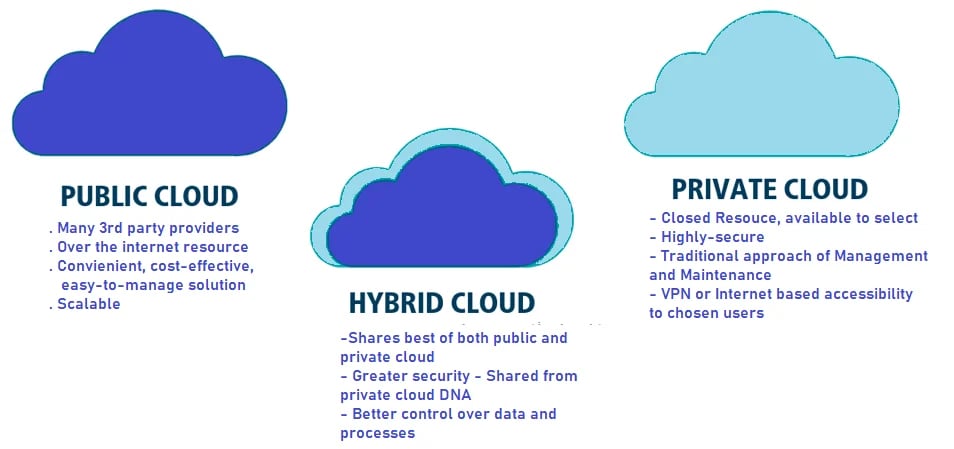Private Cloud vs Public Cloud vs Hybrid Cloud: What’s The Difference?

Nowadays, businesses have several options when it comes to cloud hosting. The three main types of cloud web hosting services are private cloud, public cloud and hybrid cloud. Each has its own benefits and drawbacks.
Before diving into the differences between hybrid vs public vs private cloud models, let’s quickly define Cloud hosting to help you understand which might be best for your organisation.
What is Cloud Hosting?
Cloud hosting lets you store and get to data and applications over the internet instead of on your computer or server. So, cloud hosting offers benefits like scalability, cost-effectiveness and ease of access from anywhere.
Private Cloud
A private cloud is a cloud environment created specifically for a single organisation. It’s like having your own personal cloud that only you and your company can access.
Benefits of Private Cloud:
- Enhanced Security: Since it’s used by only one organisation, a private cloud offers better control over data and security measures.
- Customisation: You can tailor the infrastructure to meet your specific needs.
- Compliance: It’s easier to meet regulatory requirements when you have full control over the environment.
Drawbacks:
- Higher Costs: Setting up and maintaining a private cloud can be expensive.
- Limited Scalability: Expanding resources might require significant time and investment.
Public Cloud
A public cloud is a cloud environment shared by multiple organisations. It’s owned and operated by a third-party provider, and you access it over the internet.
Benefits of Public Cloud:
- Cost-Effective: You only pay for what you use without the need for large upfront investments.
- Scalability: It’s easy to increase or decrease resources as needed.
- Maintenance-Free: The provider handles all updates and maintenance.
Drawbacks:
- Less Control: You have limited control over the infrastructure and security measures.
- Potential Security Concerns: Sharing resources with other organisations might raise security worries for some businesses.
Hybrid Cloud:
Rather than choosing between public cloud vs private cloud, a hybrid cloud combines elements of both types. It allows data to be shared between them.
Benefits of Hybrid Cloud:
- Flexibility: You can use your private cloud to store sensitive data and the public cloud for less critical tasks.
- Cost-Effective Scaling: Use the public cloud to handle traffic spikes without investing in more private infrastructure.
- Improved Disaster Recovery: You can replicate data and applications across both environments for better backup and recovery options.
Drawbacks:
- Complexity: Managing two different cloud environments can be challenging.
- Potential Integration Issues: Ensuring smooth communication between private and public clouds might require additional effort.
Private Cloud vs Public Cloud vs Hybrid Cloud: Making the Right Choice
When deciding between private cloud vs public cloud vs hybrid cloud, consider these factors:
- Security Needs: If security is very important to you, a private or hybrid cloud might be best.
- Budget: Public clouds are often the most budget-friendly option.
- Scalability Requirements: Public and hybrid clouds offer the most flexibility in scaling.
- Compliance: If you’re in a highly regulated industry, a private or hybrid cloud might be necessary.
- IT Expertise: Public clouds require less in-house IT knowledge to manage.
Cloud Hosting Benefits: Why Move to the Cloud?
Regardless of which type you choose, cloud hosting offers several benefits:
- Cost Savings: Reduce or eliminate the need for physical hardware and maintenance.
- Scalability: Easily adjust resources based on your needs.
- Accessibility: You have access to your files from anywhere with an internet connection.
- Disaster Recovery: Improved backup and recovery options compared to traditional on-premises solutions.
Conclusion
The choice between private cloud, public cloud, and hybrid cloud depends on your organisation’s specific needs, resources, and goals. When considering public cloud vs hybrid cloud or private cloud vs public cloud, it’s important to understand the benefits of each approach.


